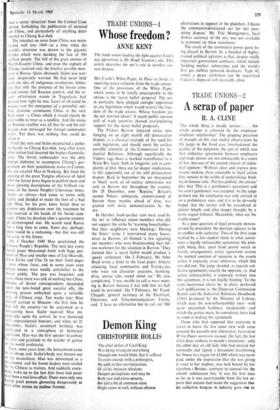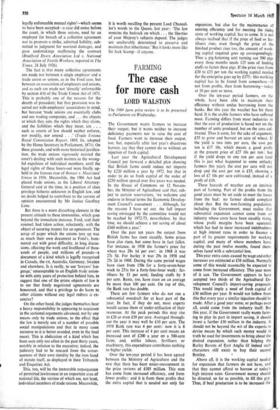A scrap of paper
TRADE UNIONS-2 R. A. CLINE
'The whole thing is deadly serious . . . the whole matter is coloured by the employee- employer relationship.' The gripping precision of thought of this and similar observations by the judge in the Ford case foreshadowed the quality of the judgment, the gist of which was that collective agreements between employers and trade unions are not enforceable in a court of law, because of the current climate of indus- trial opinion—`Without clear and express pro- visions making them amenable to legal action they remain in the realm of undertakings bind- ing in honour only.' Put less politely, the unions' plea that 'This is a gentlemen's agreement and we aren't gentlemen' was accepted. As the judge pointed out, his conclusion was only arrived at on a preliminary view, and it is to be devoutly hoped that the matter will be considered at greater length, and after deeper thought, by a more august tribunal. Meanwhile, what are the implications?
As a pure question of legal principle demon- strated by precedent, the decision appears to be in conflict with authority. Two of the first cases studied by a law student relate to what consti- tutes a legally enforceable agreement, the prin- ciple being that, apart from purely social or family arrangements, every agreement carries the normal sanction of recourse to the courts unless it expressly states otherwise, which this one did not. The judge decided, as regards col- lective agreements, exactly the opposite, i.e. that unless enforceability is expressly written into the agreement, it is not legally binding. To the cases mentioned above he, in effect, preferred such publications as the Donovan Commission Report and the Industrial Relations Handbook (1961) produced by the Ministry of Labour, which state the non-enforceability view—with quite unjustified baldness, incidentally—and which the parties must, he considered, have had in mind in making the agreement.
Those who had supposed that everyone is taken to know the law must view with some concern the possible new alternative, Ignoraniia White Paper neminem excusat. (In fact, the law often does violence to people's intentions: only the other day an old lady who had mislaid her spectacles and signed a document transferring her house to a rogue for £3,000 which was never paid, under the impression that she was giving it away to her nephew, was held bound by her signature.) Besides, contrary to counsel for the unions' submission that 'it was the first time so far as it was ascertainable from the law re- ports that anyone had made the suggestion that the collective bargain in industry gave rise to
legally enforceable mutual rights'—which seems to have been accepted—a case did come before the court, in which three unions, sued by an employer for breach of a collective agreement not to promote a strike, admitted liability, sub- mitted to judgment for nominal damages, and gave undertakings reaffirming the contract (Bradford Dyers Association Ltd v. National Association of Textile Workers, reported in The Times, 24 July 1926).
The fact is that many collective agreements are made not between a single employer and a trade union or unions, as in the Ford case, but between an association of employers and unions, and as such are made not 'directly' enforceable by section 4(4) of the Trade Union Act of 1871. This is probably one of the reasons for the dearth of precedent; but that provision was in- serted not with employers' associations in mind, but because 'trade unions are essentially clubs and not trading companies, and. . . the objects at which they aim, the rights which they claim, and the liabilities which they incur, are . . . such as courts of law should neither enforce, nor modify, nor amend . . .' (Trade Unions Royal Commission Report, 1869, lix, adopted by the Home Secretary in Parliament, 1871). On these grounds, and with more historical justifica- tion, the trade unions vigorously resisted the court's dealing with such matters as the wrong- ful expulsion of individual members, until the legal rights of these losers-out were finally up- held in the famous case of Bonsor v. Musicians' Union in 1956. Meanwhile, the 1906 Act had placed trade unions, as the Liberal Attorney- General said at the time, in a position of class privilege hitherto unknown in English law, and no doubt helped to contribute to the current of opinion encountered by Mr Justice Geoffrey Lane.
But there is a more disturbing element in the present attitude to these immunities, which goes beyond the immediate instance. Ford, said their counsel, had taken action, reluctantly, with the object of securing respect for an agreement. The scrap of paper which the unions tore up was as much their own document as Ford's, ham- mered out with great difficulty, in long discus- sions, affecting the work and livelihood of thou- sands of people, and millions of pounds—a document of a kind which is legally recognised in Canada, the us, Australia, Germany, Sweden and elsewhere, Is it really, to use 'lawyers' lan- guage,' unacceptable to an English trade union- ist with sixty years of protection behind him, to suggest that one of the prime objects of law is to see that freely negotiated agreements are honoured, and that a privilege to do harm to other citizens without any legal redress is ex- cessive?
On the other hand, the judges themselves bear a heavy responsibility in appearing to acquiesce in the sectional arguments advanced, not by any means only by trade unions, to the effect that the law is merely one of a number of possible social manipulations and that in many cases recourse to it is better avoided, even in the final resort. This is abdication of a kind which has been seen only too often in the past thirty years, notably in relation to the executive; indeed, the judiciary had to be rescued from the conse- quences of their own timidity by the iron hand of statute itself, as displayed in their Tribunals and Enquiries Act.
This, too, will be the inexorable cogsequence of permitted lawlessness in an important area of national life, the victims of which are, not least, individual members of trade unions. Meanwhile,
It is worth recalling the present Lord Chancel- lor's words to the Queen, last year: 'The law remains the bedrock on which . . . the liberties of your Majesty's subjects depend. The judges are unalterably determined to preserve and maintain that inheritance.' But it looks more like Sir Jack Scamp—if anyone.



































 Previous page
Previous page